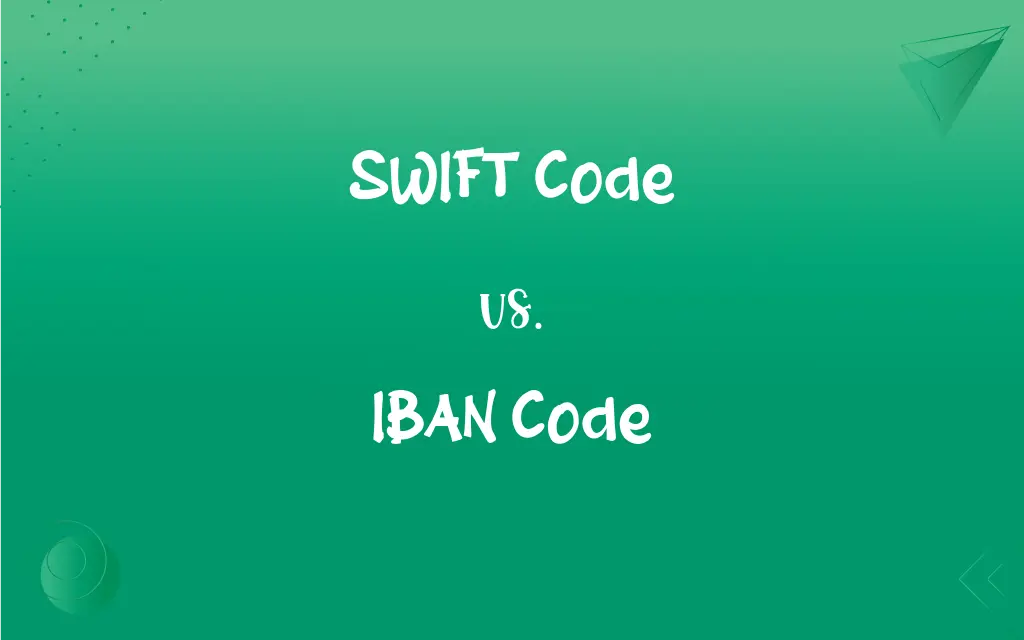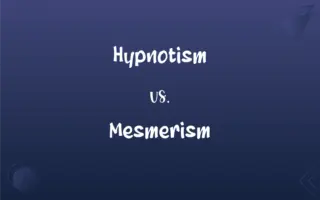SWIFT Code vs. IBAN Code: What's the Difference?
Edited by Janet White || By Harlon Moss || Updated on October 17, 2023
"Swift code" identifies a specific bank for international transactions, while "IBAN code" provides specific account details within a bank globally.

Key Differences
"Swift code" and "IBAN code" both play crucial roles in international banking, but serve distinct purposes. The "swift code", an acronym for Society for Worldwide Interbank Financial Telecommunication code, is a unique identifier for banks during international transactions. Comprising 8 or 11 characters, it pinpoints the bank's location and branch, ensuring that funds are channeled accurately between institutions.
Contrastingly, the "IBAN code", which stands for International Bank Account Number, zeroes in on a particular bank account, allowing funds to be sent directly to that account. It is a standardized, internationally accepted code that includes country, bank, and account details. While the "swift code" identifies the bank, the "IBAN code" narrows it down to an individual account within that bank.
The use of both "swift code" and "IBAN code" enhances the efficiency and accuracy of international transactions. Misrouting is minimized, ensuring that funds reach their intended destination. Although both codes are crucial for global banking, not all countries use the IBAN system. However, the swift system is more universally recognized.
Lastly, when making international transactions or wire transfers, both the "swift code" and "IBAN code" are often required. The "swift code" ensures the money reaches the correct bank, and the "IBAN code" ensures it gets to the right account within that bank.
Comparison Chart
Purpose
Identifies a bank globally
Specifies an individual account globally
ADVERTISEMENT
Stands For
Society for Worldwide Interbank Financial Telecommunication
International Bank Account Number
Length
8 or 11 characters
Varies by country, up to 34 characters
Composition
Letters and sometimes numbers
Country code, check digits, bank and account details
Universal Use
Universally recognized
Not adopted by all countries
SWIFT Code and IBAN Code Definitions
SWIFT Code
Swift code aids in international bank transactions.
Without the correct swift code, your transfer may not process.
ADVERTISEMENT
IBAN Code
IBAN code facilitates precise international transfers.
Using the correct IBAN code ensures your money reaches the right account.
SWIFT Code
Swift code comprises 8 or 11 characters.
Ensure the swift code you entered is valid and of the right length.
IBAN Code
Not all countries have adopted the IBAN system.
While many countries use the IBAN code, some still rely on other systems.
SWIFT Code
Swift code is essential for accurate fund routing.
Always double-check the swift code before initiating a transfer.
IBAN Code
IBAN code is a standardized bank account identifier.
Provide your IBAN code so I can send you the money.
SWIFT Code
Swift code differentiates banks and their branches.
Each bank branch may have a distinct swift code.
IBAN Code
IBAN code includes country, bank, and account details.
An IBAN code starts with a country's code followed by specific account information.
SWIFT Code
Swift code is a bank's unique global identifier.
To wire money internationally, you'll need the bank's swift code.
IBAN Code
IBAN code's length can vary by country.
While my US bank doesn't use an IBAN code, my European bank's IBAN is 27 characters long.
FAQs
Is the "IBAN code" the same as a bank account number?
No, an IBAN includes country, bank, and specific account details, while an account number is just a part of the IBAN.
Is the "IBAN code" mandatory for all international transfers?
While many countries use the IBAN, not all do. It depends on the countries involved in the transfer.
How many characters does a "swift code" have?
A swift code can have either 8 or 11 characters.
Is there a risk if I provide the wrong "swift code"?
Yes, funds might be misrouted or delayed if the wrong swift code is used.
Where can I find my bank's "swift code"?
You can find it on your bank's website, statement, or by contacting the bank.
Do all countries use the "swift code" system?
Most countries use the swift system, especially for international transactions.
Are "swift code" and "IBAN code" secure?
Yes, they are tools for transaction accuracy, not for account access.
Is there a charge for using "swift code" or "IBAN code"?
The codes themselves don't incur charges, but banks might have fees for international transactions.
What does a "swift code" represent?
A swift code uniquely identifies a bank or its branch in international transactions.
Why do we need both "swift code" and "IBAN code" for transfers?
The swift code identifies the bank, while the IBAN pinpoints the exact account within that bank.
What happens if I use an incorrect "IBAN code"?
Transactions might fail, get delayed, or funds could go to the wrong account.
Why is the "swift code" sometimes called a BIC?
BIC stands for Bank Identifier Code, another name for the swift code.
How is the "IBAN code" structured?
It starts with a country code, followed by check digits, bank identifiers, and the specific account number.
How long is an "IBAN code"?
It varies by country, but can be up to 34 characters.
Can I find my "IBAN code" on my bank statement?
Yes, most banks that use IBAN will include it on statements.
Is the "IBAN code" unique to each account holder?
Yes, each IBAN code is unique to an individual account.
Can I use only the "swift code" for international transactions?
In many cases, both swift and IBAN codes are needed to ensure transaction accuracy.
Do US banks use the "IBAN code"?
No, US banks primarily rely on routing numbers and account numbers instead.
Why do some "swift codes" have only 8 characters?
An 8-character swift code identifies the bank, while 11 characters specify a bank's branch.
Do all banks have a "swift code"?
Not necessarily, but most major banks, especially those involved in international transactions, have a swift code.
About Author
Written by
Harlon MossHarlon is a seasoned quality moderator and accomplished content writer for Difference Wiki. An alumnus of the prestigious University of California, he earned his degree in Computer Science. Leveraging his academic background, Harlon brings a meticulous and informed perspective to his work, ensuring content accuracy and excellence.
Edited by
Janet WhiteJanet White has been an esteemed writer and blogger for Difference Wiki. Holding a Master's degree in Science and Medical Journalism from the prestigious Boston University, she has consistently demonstrated her expertise and passion for her field. When she's not immersed in her work, Janet relishes her time exercising, delving into a good book, and cherishing moments with friends and family.































































